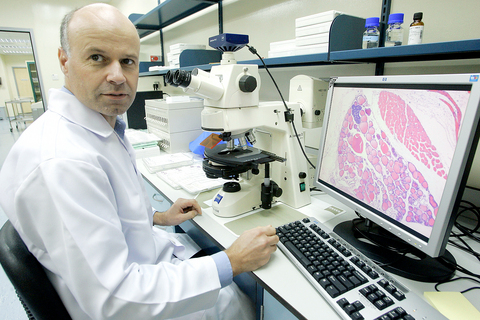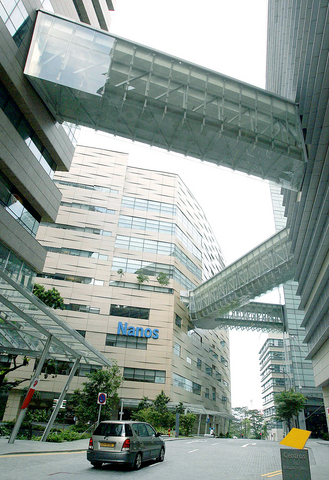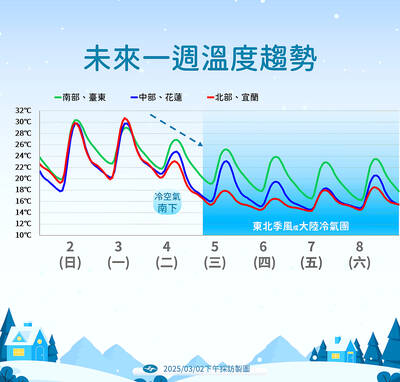Singapore believes it has seen the future, and its name is the Biopolis.
The sparkling new US$300 million suburban complex of angular buildings, erected on hilly ground next to the Ministry of Education, is the nerve center of the city-state's campaign to become a global science hub.
Scientists from Europe, North America and Asia are now relocating to the Biopolis, thanks to attractive salaries, an expatriate-friendly environment and relatively liberal rules on cutting-edge fields like stem cell research.

PHOTO: AFP
At the same time, more than 500 of Singapore's brightest students are now being sent to top foreign universities to earn doctorates and lead Singapore's charge into the brave new world of biomedical industries in the 21st century.
With assembly-line manufacturing under long-term threat from lower-cost countries, Singapore is banking on science as a new economic growth engine.
It hopes a thriving research sector will produce a long-term windfall from patented discoveries and steadily reduce Singapore's heavy dependence on the cyclical and increasingly crowded electronics sector.

PHOTO: AFP
"Never fall in love with an industry," said Philip Yeo, the co-chairman of the Economic Development Board (EDB), the investment promotion agency that was instrumental in Singapore's rise as a top electronics production center.
Now, as concurrent head of the Agency for Science, Technology and Research, Yeo is nudging Singapore toward "knowledge economy" industries centered at the Biopolis, where brains, investment and public funding are all in one place.
"The day we relax, we're a goner," Yeo said.
The academics are literally being turned into poster boys and girls of the agency to convince students to take up science as a profession.
"In Singapore we don't glorify footballers," Yeo said.
It will cost up to US$600,000 to finance the education of each student from a basic university degree to a full-blown doctorate, eight years of study which the student must repay with six years of service to the government.
About 15 percent of the academics are naturalized citizens.
One of them is Chinese-born Liang Jing, 24, who is pursuing a degree in biomedical engineering at the University of Michigan. He is the only child of an engineer and his wife who migrated to Singapore when he was 11.
"I do not come from a wealthy family. Without this scholarship, I would probably do a local engineering degree instead," he said by e-mail.
Liang said he wants to someday head "a self-sustaining research institute in Singapore that does not depend on government funding once established."
Yeo says the country wants "hungry kids from the region" to help power its scientific ambitions.
"Intelligence is not enough. You need hunger," he said.
Science academics are in Yeo's words "more expensive than an infantry battalion" but Singapore can well afford it -- it has close to US$120 billion in foreign reserves.
The first of the newly-minted doctors will return in 2008 and 2009 to jobs with starting salaries of more than US$40,000 a year, and stand to earn much more in the private sector after they complete their government study bonds.
It's already well-known in the scientific world that Singapore is out to lure some of the best names in basic research.
One of those who have moved here is Alan Coleman, the British scientist who in 1996 delivered Dolly the sheep, the world's first cloned mammal.
When the Biopolis is fully occupied, it can host about 2,000 scientists engaged in stem cell, cancer and other forms of fundamental research aimed at finding cures for some of the oldest and most debilitating diseases.
In buildings named Matrix, Centros, Nanos, Genome, Helios, Chromos and Proteos interlinked by pedestrian skyways, scientists in laboratory coats and jeans work in meticulously planned surroundings at the Biopolis.
The buildings are clustered around a courtyard with restaurants, a wine bar, a convenience store and a hair salon.
There's a laundry that also sells laboratory coats.
Old trees have been planted in the middle of the courtyard, with artificial waterfalls and a carp pond giving the Biopolis a park-like atmosphere.
A prison next door where some shirtless inmates can still be seen from the laboratories will give way to the further expansion of the Biopolis, which will also have its own business hotel, condominium and gourmet restaurants.
"The key is to bring in critical mass, co-locate," Yeo said.
The Singapore government itself has an investment arm, BioOne Capital Pte Ltd, which manages more than US$700 million in funds invested in biomedical business ventures worldwide including some in Biopolis itself.
One of the foreign companies now operating there is British firm Paradigm Therapeutics, which specializes in early-stage drug discovery particularly for the central nervous system, metabolic diseases and pain. It now employs nine scientists at Biopolis and plans to double its staff over the next year.
Ian Gray, its director of research, said Singapore's stable infrastructure, English-speaking environment and strong skills base in molecular biology and cell culture were strong attractions for his firm.
"We have samples that are stored at minus 80 degrees. We can't afford for the power to go down for any length of time," he said.
A high-level panel has recommended the doubling of Singapore's research and development spending to more than US$7 billion over the next five years, which means more scholarships for Singaporeans, native or naturalized.
Prime Minister Lee Hsien Loong, a British-educated mathematician, announced over the weekend that he will chair a new Research, Innovation and Enterprise Council that will oversee the ambitious drive to make money out of science.
"There are risks in this approach, but we have to do this," Lee said. "If we succeed, we will gain competitive advantage that puts us ahead for 15 to 20 years."

SECURITY: The purpose for giving Hong Kong and Macau residents more lenient paths to permanent residency no longer applies due to China’s policies, a source said The government is considering removing an optional path to citizenship for residents from Hong Kong and Macau, and lengthening the terms for permanent residence eligibility, a source said yesterday. In a bid to prevent the Chinese Communist Party (CCP) from infiltrating Taiwan through immigration from Hong Kong and Macau, the government could amend immigration laws for residents of the territories who currently receive preferential treatment, an official familiar with the matter speaking on condition of anonymity said. The move was part of “national security-related legislative reform,” they added. Under the amendments, arrivals from the Chinese territories would have to reside in Taiwan for

CRITICAL MOVE: TSMC’s plan to invest another US$100 billion in US chipmaking would boost Taiwan’s competitive edge in the global market, the premier said The government would ensure that the most advanced chipmaking technology stays in Taiwan while assisting Taiwan Semiconductor Manufacturing Co (TSMC, 台積電) in investing overseas, the Presidential Office said yesterday. The statement follows a joint announcement by the world’s largest contract chipmaker and US President Donald Trump on Monday that TSMC would invest an additional US$100 billion over the next four years to expand its semiconductor manufacturing operations in the US, which would include construction of three new chip fabrication plants, two advanced packaging facilities, and a research and development center. The government knew about the deal in advance and would assist, Presidential

‘DANGEROUS GAME’: Legislative Yuan budget cuts have already become a point of discussion for Democrats and Republicans in Washington, Elbridge Colby said Taiwan’s fall to China “would be a disaster for American interests” and Taipei must raise defense spending to deter Beijing, US President Donald Trump’s pick to lead Pentagon policy, Elbridge Colby, said on Tuesday during his US Senate confirmation hearing. The nominee for US undersecretary of defense for policy told the Armed Services Committee that Washington needs to motivate Taiwan to avoid a conflict with China and that he is “profoundly disturbed” about its perceived reluctance to raise defense spending closer to 10 percent of GDP. Colby, a China hawk who also served in the Pentagon in Trump’s first team,

The arrival of a cold front tomorrow could plunge temperatures into the mid-teens, the Central Weather Administration (CWA) said. Temperatures yesterday rose to 28°C to 30°C in northern and eastern Taiwan, and 32°C to 33°C in central and southern Taiwan, CWA data showed. Similar but mostly cloudy weather is expected today, the CWA said. However, the arrival of a cold air mass tomorrow would cause a rapid drop in temperatures to 15°C cooler than the previous day’s highs. The cold front, which is expected to last through the weekend, would bring steady rainfall tomorrow, along with multiple waves of showers